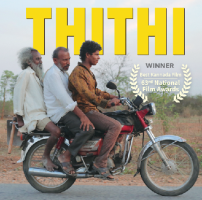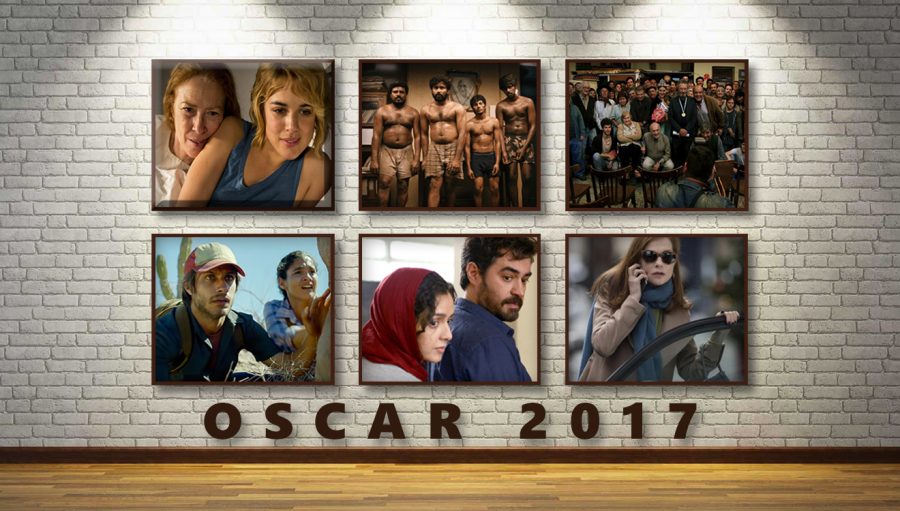The deadline for submitting films for the Best Foreign Language Film category at the Academy Awards for 2017 ended on October 1. The Academy received 85 entries. Last year, the total number of contestants was 81.
Although the final winner will be announced only on February 26, on Oscar night, favourites and predictions are already doing the rounds. Notable entries this year are Spain’s Julieta, directed by master auteur Pedro Almodov, Iran’s The Salesman, directed by Asghar Farhadi, France’s Elle, directed by Paul Verhoeven, Mexico’s Desierto, directed by Jonás Cuaróndes, Germany’s Toni Erdmann, directed by Maren Ade, and Chile’s Neruda, directed by Pablo Larraín.
Selection process
Here is how the nomination process goes:
First, the Academy members of the Foreign-Language Film screening committee are divided into groups. Over two months, ending in mid-December, they watch and rate the films. The top six films, plus three films chosen by the 20-member executive committee, make it to the next round.
In early January, the nine semi-finalists are screened for the committee members, who then vote for the final five.
On January 24, the finalists are revealed, along with finalists in other categories.
The Academy members watch these five films and vote for the winner, which is announced on February 26, Oscar night.
India’s Choice
India’s submission to the Oscars is director Vetrimaran’s Tamil film Visaaranai, a hard-hitting drama on police brutality in the country. Co-produced by actor Dhanush’s Wunderbar Films, the film was reportedly chosen unanimously by the Oscar selection committee, over other contenders including Thithi, Udtaa Punjab, and Pink.
Read: Visaaranai Review: No Country For Noble Men
Visaaranai‘s Oscar chances are debatable, however, despite its undeniable cinematic value. It’s no secret that winning at the Oscars is more dependent on effective marketing than the film’s quality. For instance, Denmark, a country which makes less than 20 films a year, has made it to the final five 11 times, and won thrice. According to Steffen Andersen-Møller, the head of department for audiences and promotion at the Danish Film Institute, it’s about how hard you push the film to a global audience. “It’s all part of a long-term international business model. We have been very active at international film festivals like Toronto, Cannes and Berlin, and we use the festivals as effectively as we can to get our films noticed”, he recently explained in an interview.
Read: Court-ing the Oscars: Marketing Indian Films At The Academy Awards
Visaaranai‘s biggest win off-shore has been the Amnesty International Italia Award at the Venice Film Festival. The award is given for Cinema for Human Rights. Visaaranai‘s theme of human rights violation in developing countries, and its violent portrayal of the issue might get lost at the Oscars, though. The highlight of Visaranai is its rawness and the brutal violence it shows. The Academy members might find nothing unique in this theme and style, used as they are to violent dramas on civil rights violations every year, not to mention their familiarity with disturbing holocaust dramas.
Another strong contender this year is Mexico’s Desierto, a violent thriller on immigration and the border crisis, co-produced by Alphonso Cuaron. It stars Gael Garcia Bernal, an actor the West come to love through films like Amorres Perros and No.
 Visaaranai was preferred by India’s Oscar committee over another south Indian film, Thithi, which comes from an entirely different genre. The fact that Thithi, directed by Raam Reddy, was co-produced by the American company, Sunmin Park, which has previously been associated with Hollywood films like The Others, would have worked in India’s favour at the Oscars. Besides, Thithi has won prizes and accolades at over 10 International Film Festivals across the world, including the Best Feature Award at the first BRICS film festival.
Visaaranai was preferred by India’s Oscar committee over another south Indian film, Thithi, which comes from an entirely different genre. The fact that Thithi, directed by Raam Reddy, was co-produced by the American company, Sunmin Park, which has previously been associated with Hollywood films like The Others, would have worked in India’s favour at the Oscars. Besides, Thithi has won prizes and accolades at over 10 International Film Festivals across the world, including the Best Feature Award at the first BRICS film festival.
Thithi‘s sharp humour has already found many takers in the West. Its list of high-profile fans include Francis Ford Coppola, the director of the Godfather series. After watching the film, he said, “I want to grow up and be like Century Gowda (one of the main characters of the film).” His official review says, “Thithi is joyous with unforgettable characters.”
After the screening of the film at the Morocco film festival, Raam Reddy said, “Our last festival participation in Morocco was unbelievable, as the jury included just about every international filmmaker I have adored. In addition to the directors, I know that personalities like Wes Anderson, Jean-Pierre and even Tom Cruise know of Thithi, while some have watched it as well.”
Read: Thithi Review: Notes From The Countryside
The Hollywood Reporter, in its review, compared Thithi to backwood comedies like My Sweet Little Village, a Czechoslovakian film which won massive international acclaim.
By selecting Visaranai over Thithi, India might have repeated the mistake it made in 2014, when it chose The Good Road over The Lunch Box, an international favourite.
Here is the list of submissions for the Oscars:
Afghanistan: Parting, directed by Navid Mahmoudi, director;
Albania, “Chromium,” directed by Bujar Alimani, director;
Algeria, “The Well ,”directed by Lofti Bouchouchi
Argentina: The Distinguished Citizen, directed by Mariano Cohn and Gastón Duprat
Armenia, “Earthquake,”directed by Sarik Andreasyan
Australia, “Tanna,” directed by Martin Butler & Bentley Dean
Austria, “Stefan Zweig: Farewell to Europe ,” directed by Maria Schrader
Bangladesh, “The Unnamed,” directed by Tauquir Ahmed
Belgium, “The Ardennes,” directed by Robin Pront
Bolivia, “Sealed Cargo,” directed by Julia Vargas-Weise, director;
Bosnia and Herzegovina, “Death in Sarajevo,” directed by Danis Tanovic
Brazil, “Little Secret,” directed by Daniel Schumann
Bulgaria, “Losers,” directed by Ivarlo Hristov
Canada, “It’s Only the End of the World,” directed by Xavier Dolan
Chile, “Neruda,” directed by Pablo Larraí
Colombia, “Alias Maria,” directed by José Luis Rugeles Gracia
Croatia, “On the Other Side,” directed by Zrinko Ogresta
Cuba, “The Companion,” directed by Pavel Giroud
Czech Republic, “Lost in Munich,” Petr Zelenka
Denmark, “Land of Mine,” directed by Martin Zandvliet
Dominican Republic, “Flor de Azucara,” directed by Fernando Baez Mella
Egypt, “Clash,” directed by Mohamed Diab
Estonia, “Mother,” directed by Kadri Kõusaare
Ethiopia: Lamb, directed by Yared Zeleke
Finland, “The Happiest Day in the Life of Olli Maki,” directed by Juho Kuosmanen
France, “Elle,” directed by Paul Verhoeven
Georgia, “Land of Others,” directed by Rusudan Glurdjidze
Germany, “Toni Erdmann,” directed by Maren Ade
Greece, “Chevalier,” directed by Athina Rachel Tsangari
Hong Kong, “Port of Call,” directed by Philip Yung
Hungary, “Kill on Wheels,”directed by Attila Till
Iceland, “Sparrows,” directed by Rúnar Rúnarsson
India, “Interroagation,” directed by Vetrimaaran
Indonesia, “Letters from Prague,” directed by Angga Dwimas Sasongko
Iran, “The Salesman,” directed by Asghar Farhadi
Iraq, “El Clasico,” directed by Halkawt Mustafa
Ireland” Viva, directed by Paddy Breathnach
Israel, “Sand Storm,” directed by Elite Zexer
Italy, “Fire at Sea,” , directed by Gianfranco Rosi
Japan, “Living with My Mother,” directed by Yoji Yamada
Jordan, “3000 Nights,” directed by Mai Masri
Kazakhstan: Amanat, directed by Satybaldy Narymbetov
Kosovo, “Home Sweet Home,” directed by Faton Bajraktari
Kyrgyzstan, ” A Father’s Will,” directed by Bakyt Mukul, Dastan Japar Uulu
Latvia, “Dawn,” directed by Laila Pakalniņa
Lebanon, “A Very Big Shot,” directed by Mir-Jean Bou Chaaya
Lithuania, “Seneca’s Day,” directed by Kristijonas Vildziunas
Luxembourg, “Voices from Chernobyl,” directed by Pol Cruchten
Macedonia, The Liberation of Skopje,” directed by Rade Sherbedzija, Danilo Sherbedzija
Mexico, ” Desierto,”directed by Jonás Cuarón,
Montenegro, “The Black Pin,” directed by Ivan Marinovic
Morocco, “A Mile in My Shoes,” directed by Said Khallaf
Nepal, “The Black Hen,”directed by Min Bahadur Bham
Netherlands, “Tonio,” directed by Paula van der Oest
New Zealand, “A Flickering Truth,” directed by Pietra Brettkelly
Norway, “The King’s Choice,” directed by Eric Poppe
Pakistan, ‘Mah e Mir,”directed by Anjum Shahzad
Palestine: The Idol, directed by Hany Abbu Assad
Panama, “Salsipuedes,” directed by Ricardo Aguilar Navarro, Manuel Rodríguez
Peru, “Videophilia (and Other Viral Syndromes),” directed by Juan Daniel Fernández
Philippines, “Ma’Rosa,” directed by Brillante Mendoza
Poland, “Afterimage,” directed by Andrzej Wajda
Portugal, “Letters from War,” directed by Ivo Ferreira
Romania, “Sieranevada,” directed by Cristi Puiu
Russia, “Paradise,” directed by Andrei Konchalovsky
Saudi Arabia, “Barakah Meets Barakah,” directed by Mahmoud Sabbagh
Serbia, “Train Driver’s Diary,”directed by Milosa Radovica
Singapore, “Apprentice,” directed by Boo Junfeng,
Slovakia, “Eva Nova,” directed by Marko Škop,
Slovenia, “Houston, We Have A Problem!,” directed by Ziga Virc
South Africa, “Call Me Thief,” directed by Daryne Joshua
Recommended
South Korea, “The Age of Shadows,” directed by Kim Jee-woon
Spain, “Julieta,” directed by Pedro Almodov
Sweden, “A Man Called Ove,”directed by Hannes Holm
Switzerland, “My Life as a Courgette,” directed by Claude Barras
Taiwan: “Hang in There, Kids!,” directed by Laha Mebow
Thailand: “Karma,”directed by Kanittha Kwanyu.
Tunisia: “The Flower of Aleppo,” directed by Ridha Behi.
Turkey: ” Cold of Kalandar,” directed by Mustafa Kara.
Ukraine: “Ukrainian Sheriffs,”directed by Roman Bondarchuk.
United Kingdom: “Under the Shadow,” directed by Babak Anvari.
Uruguay: “Breadcrumbs,” directed by Manane Rodriguez.
Venezuela: “From Afar,” directed by Lorenzo Vigas.
Vietnam: “Yellow Flowers on the Green Grass,” directed by Victor Vu.
*****



